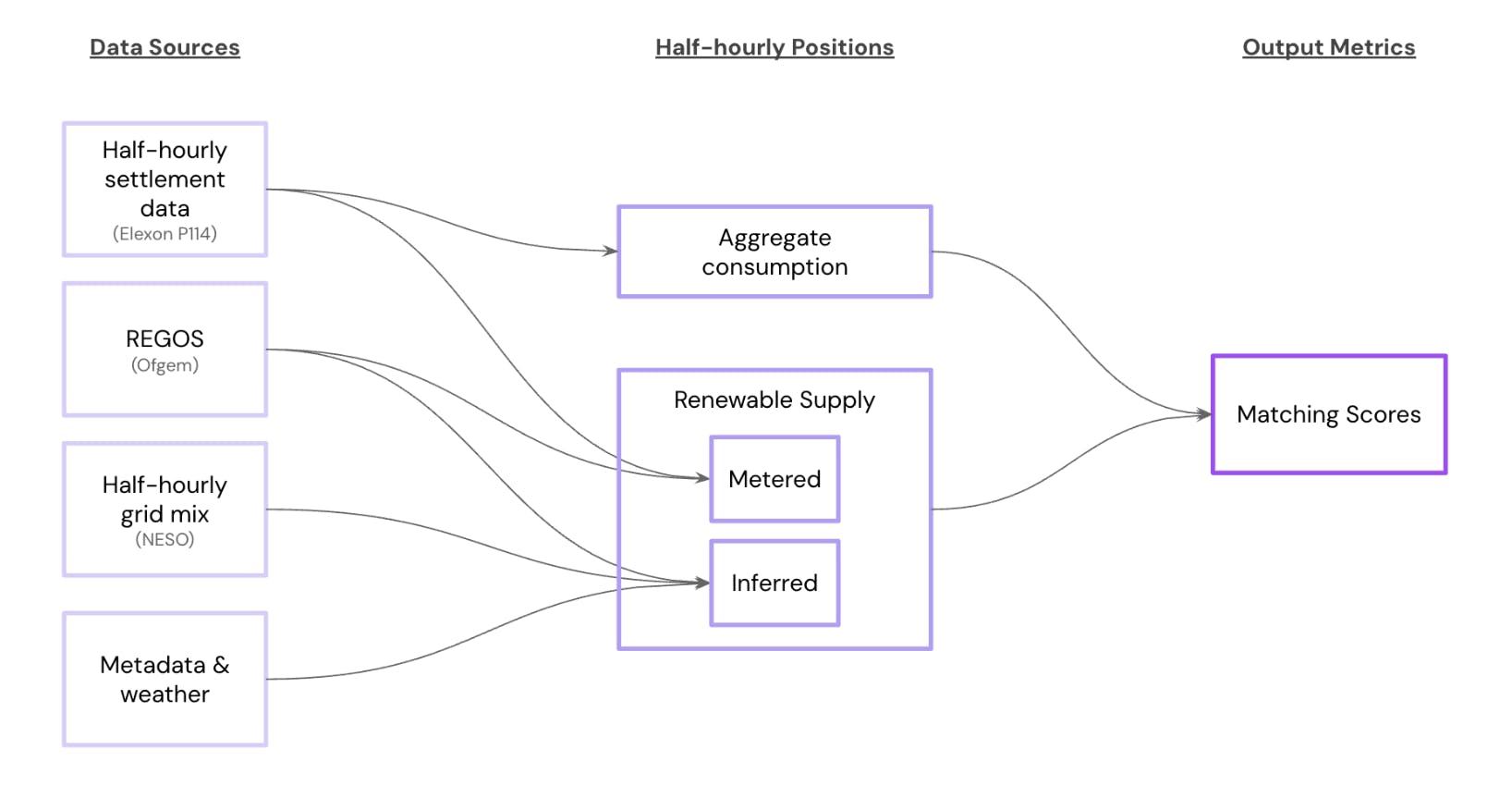Insight · 1 September 2025
The Matched Methodology: Calculating temporal matching of renewables in the UK electricity market
Matched, a new independent, open-source initiative, founded by Joe Kwiatkowski, has published methodology for calculating temporal matching between renewable energy supply and consumption in the UK electricity market. How do the ‘100% renewable’ tariffs backed by REGOs in the UK actually line up with the consumption they cover? Granular Energy's Sebastian Porter, Charles Checkley and Benedict Shegog were invited to review the methodology alongside other industry experts. This blog sets out the Matched methodology principles.

Annual ‘100% renewable’ claims allow certificates to cover fossil supply
Most UK energy retailers claim to supply 100% renewable electricity. While this claim is allowed, there’s a critical flaw: these claims are based on matching using annual certificate volumes. In practice, that means a supplier can buy certificates from solar farms in the summer to cover winter night-time consumption. As long as the total volume bought covers the consumption, the certificates can come from any time in the compliance period, substantiating the standard 100% matching claim.
The result? A customer might believe they’re provided with clean power when they are consuming electricity, when in reality, during periods of low renewable output, their power may be coming from fossil fuels.
Matched calculates half-hourly alignment of generation and consumption
While the annual matching system is called into question, energy buyers, suppliers and solution providers have started work on more traceable, transparent matching and reporting. Matched is the latest player to push for temporal matching, and its methodology gives matching scores over 30-minute periods.
Matched relies on various publicly available datasets:
- REGO cancellations at the end of a compliance period (data from Ofgem's RER)
- Settlement data from Elexon
- Grid mix data from the National Energy System Operator (NESO).
With these datasets they calculate:
- Consumption at a tariff level,
- Renewable supply (verified with REGOs), and
- The resulting matching score: the fraction of consumption covered by renewable generation.

The final output is a matching percentage score, where 100% means a retailer’s renewables matched or exceeded demand on a half-hourly basis. Anything below shows a shortfall. The results are striking. Across 15 UK energy retailers, half-hourly matching scores ranged from just 56% to 89%. In other words, two suppliers making identical “100% renewable” claims might deliver vastly different real-world outcomes.
Half-hourly matching exposes shortfalls and guides market, policy and system change
Beyond a reporting score, Matched's work has strong system and market implications.
- Consumer transparency: energy buyers can compare retailers on actual renewable alignment with their consumption, going beyond just the certificates.
- Market signals: hourly reporting reveals renewable shortfalls, and highlights the need for renewables that align with demand (e.g., wind at night, storage, or baseload solutions). This creates an opportunity for suppliers to differentiate on the quality of their tariffs.
- Policy evolution: regulators can use temporal matching to improve disclosure requirements beyond outdated annual claims.
- System optimisation: the gaps between half-hourly and monthly matching highlight opportunities for system optimisation. The methodology provides a framework for identifying and addressing temporal mismatches.
Now the methodology has been published, Matched is preparing to publish the supplier scores, highlighting how the green tariffs of UK suppliers fare in terms of hourly matching scores.
Granular Energy helps suppliers report on hourly matching scores
We were glad to contribute to the Matched methodology and, more broadly, to initiatives encouraging the development of hourly matching globally, such as the 24/7 Carbon-Free Coalition technical guidelines and ongoing work with EnergyTag.
We've helped suppliers report on hourly matching scores to their consumers, highlighting what level each customer gets on the back of the REGOs they’ve purchased. UK suppliers Good Energy, Smartest, Ecotricity, TotalEnergies and many more are now offering this matching information to customers through new premium green tariffs.
Temporal matching makes renewable claims transparent and actionable
By focusing on when renewable energy is generated, not just how much is generated over a year, the Matched Methodology brings honesty to renewable claims. The matching score makes it simple: if the number is high, customers can be confident their power is genuinely clean in real time. If it’s low, the gap is visible and action can be taken to close it.
Share article